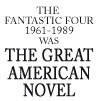





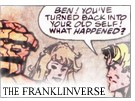

 |
 |
 |
 |
 |
 |
 |
 |
Also: a review of his life

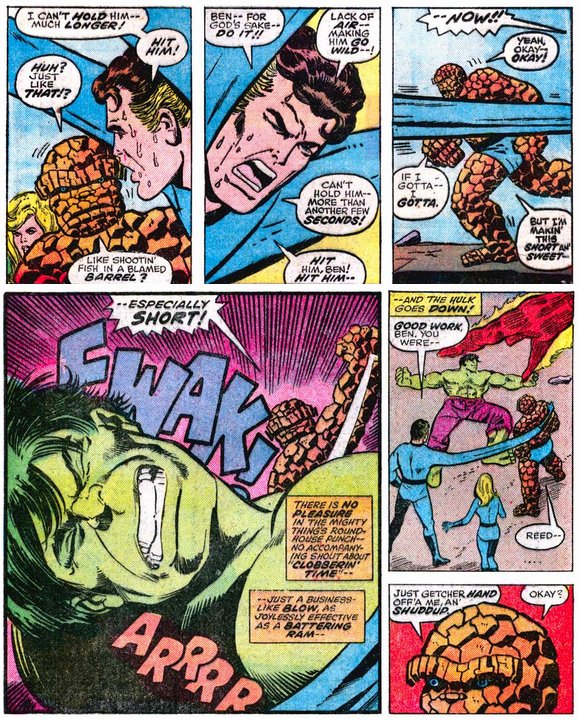
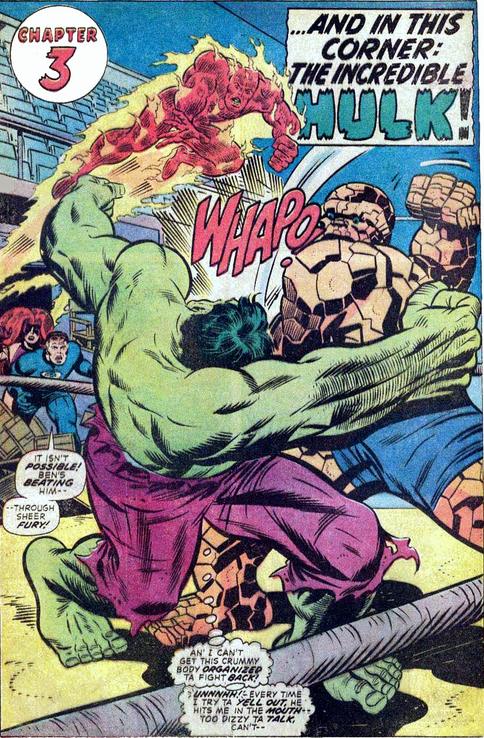
Who is stronger: the Hulk or The Thing? The Hulk and Thing have
often met, and The Thing has only beaten the Hulk once (in FF320,
or twice if you include Giant Size FF 1). The Thing believes
himself to be weaker than the Hulk and has said so. In his
gymnasium he knows his limits - e.g. 85 tons. It's an open and
shut case, right? Wrong. It is true that The Thing is unable to consciously
draw on extra strength, but that's not the whole story. He is also
unable to consciously revert back to human form. Under the
right circumstances he can do things he normally finds impossible,
like change to Ben Grimm at will... or beat the Hulk. Later we will
look at his real limits.But first, a couple more measures of his power.
The Hulk is famous for claiming to be "the strongest one there is."
That is the whole point of his magazine. But only the Fantastic Four has
any claim to continuity, for reasons discussed on this site's home
page. So if we restrict ourselves to evidence from the FF's own
magazine, we see something interesting. Although Ben believes himself to
be weaker than the Hulk, outside observers identify Ben as the world's
strongest male. Thundra, for example, came for the express purpose of
finding the strongest male and defeating him: she chose Ben Grimm.
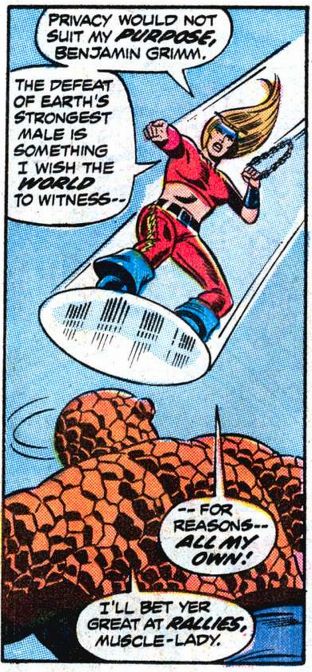
In another comic the Champion of the Universe came to the same conclusion (see below).
Criticism of the Thundra evidence
In FF151, Medusa said the Hulk and Thor are stronger than Ben. But
Medusa was simply repeating what Thundra now believed, after beating Ben
while he was sick. Thundra knew very little about the Earth, but she had been sent by scientists and historians .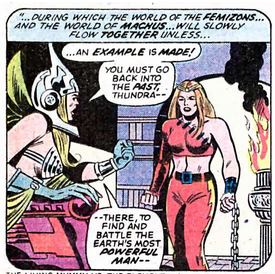
The bottom line is that the Femizons in the future
had all of human history to study.
Thundra was basing her belief on very brief anecdotal evidence, whereas
the people who sent her had the sum of human history to study. They
knew all about the Hulk, they knew all about Thor, and they sent her to
Ben Grimm. The temporal vortex that drew Thundra to the Baxter Building
was a red herring. If Thundra was looking for a green angry guy she
would have said "whoops, wrong location" and kept looking for the green
angry guy. Instead, future historians sent her to Ben Grimm.
Who is the strongest being in the galaxy? The Hulk? Thor? Some alien? Obviously this depends on how we define strength - strength without determination or intelligence may be a weakness. But the Skrulls observed the Earth for years, and must have seen both the Hulk and Thor in action and what did they conclude? Back when they staged the great games? "The strongest one they could find in the Sol Galaxy" was... The Thing.
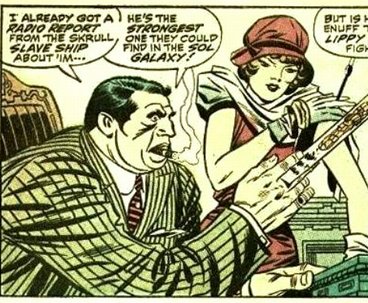
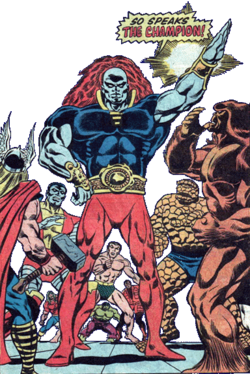
The Champion of the Universe is one of the alien Elders of the Universe. In other words, he's Galactus level. On the subject of strength, he is a universal authority. Wikipedia summarizes:
"The Champion wishes to prove himself the greatest warrior in the universe. He keeps himself busy by fighting powerful warriors throughout the universe, and has even fought a number of assorted Earth superheroes, including The Thing, both the Incredible Hulk and the She-Hulk, Colossus, Thor, and Wonder Man. ... Of all the opponents the Champion ever faced, only the Thing lasted more than two rounds. The Champion could not be beaten (he was, after all, an Elder of the Universe), but the Thing astonished the Champion with his resilience and courage, leading the Champion to say the Thing was the opponent he had sought through the ages, the one who would require all of his might and skill. His jaw broken and severely beaten after collapsing at the end of the third round, the Thing crawled across the ring to demand the fight continue when the Champion claimed victory. When forced to choose between killing his defeated opponent or yielding, the Champion yielded. When the Thing said he was "just too stupid and ugly to give up," the Champion replied he could never defeat the Thing. He might break his bones and his body, but he could not break his spirit. Any planet which could produce a champion such as the Thing, he said, was a truly worthy world."
Note: The Hulk was disqualified because the Champion refused to "soil his hands on a mindless animal." Strength is more than destructive power. Strength is how you apply that power: it includes intelligence, skill, and spirit. In these areas the Thing is well above Hulk level. Thor was disqualified because he needed his hammer: The Champion was looking for unaided strength.
So Why does Ben think he's weaker than the Hulk? Let's step inside Ben's mind.
The first FF annual contained a series of pages looking back at the
comic, and ending with a section answering reader's questions. One
question concerned the Thing's strength:
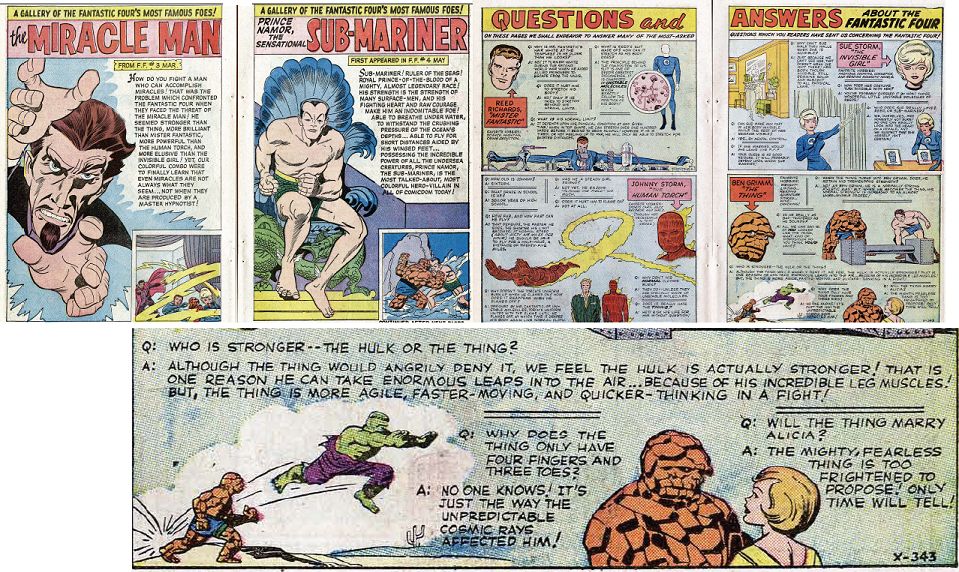
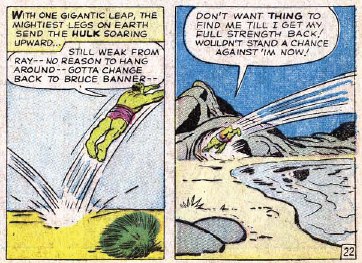
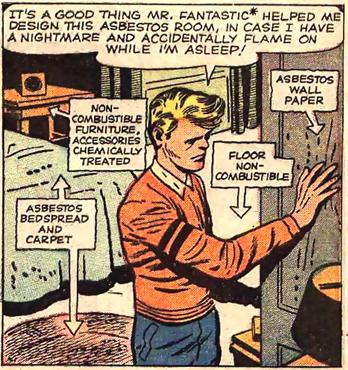
Like the Hulk, The Thing's power is controlled by his complex psychology. For example, he is unable to change back to human form because subconsciously he doesn't want to, even though consciously he wants to.
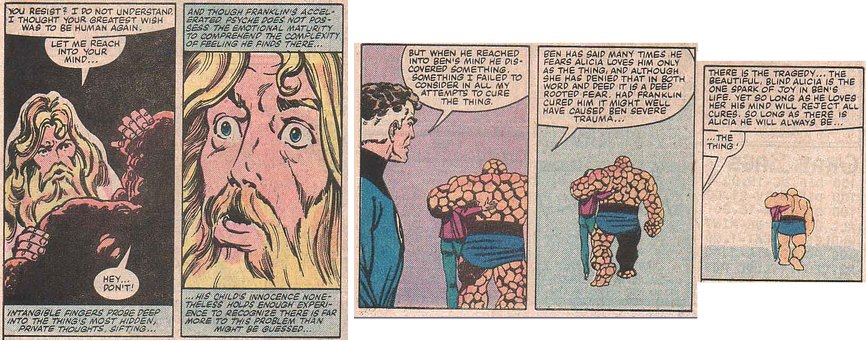
Reed must have suspected these psychological restraints because his first successful attempt to cure The Thing involved removing these restraints. AN unfortunate side effect is that, without his internal restraint, the Thing became evil (see FF 210-212).
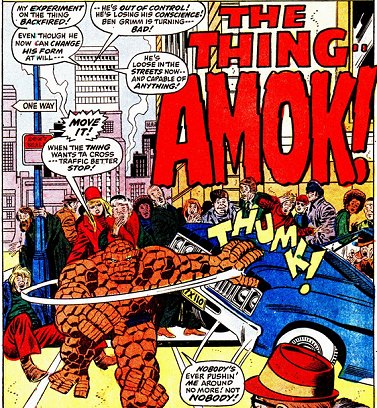
At this time he fought the Hulk, and they were evenly matched. The Hulk was slightly stronger only because he was slightly bigger.
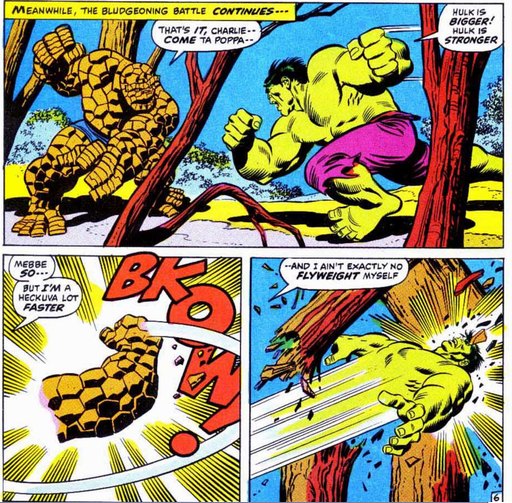
The Hulk only won because The Thing was distracted at a crucial moment.

Their next major battle ended in a similar way: the Hulk can only win when Ben is weakened.
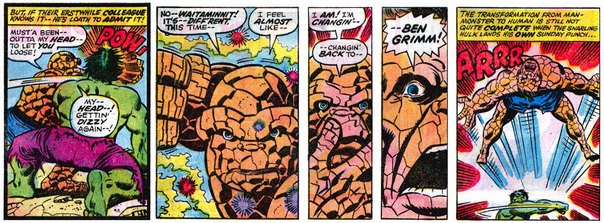
This issue also implies that when Ben is around the Hulk he's weakened by the Hulk's gamma radiation. No doubt this contributes to his belief that he is slightly weaker. However, the biggest difference is that the Hulk gets stronger as he gets angrier, whereas the Thing does not let himself get angry so remains at the same strength level.
The Hulk never pulls his punches. But the Thing nearly always
does.
"This is what the Thing has always feared more than anything else,
that he would lose control and really clobber somebody." (-
Stan Lee, in "Marvel Comics: The Untold Story" by Sean Howe, p.
64)
As we saw with his ability to change, Ben's abilities are restrained by subconscious psychological blocks. Reed sees this and tells him his he's weaker than the Hulk (e.g. in FF25). As a result he believes his strength is limited. But his belief is misguided, as we shall see.
It appears that the Hulk and Thing have the same basic powers (when adjusted for size), but Ben's default psychological state is not rage. The Hulk's default state is rage, due to Bruce Banner's childhood abuse. But he Thing's default psychological state is repression, due to hating his appearance, unconscious fear of hurting anyone, and inner conflict over marrying Alicia. So the Thing subconsciously restrains himself, and believes himself weaker. The Hulk does not know restraint, and believes himself the strongest one there is.
When Alicia married Johnny, Ben started to work through his psychological issues. It's no coincidence that he then became much stronger (the famous Pineapple Thing stage when he decisively beat the Grey Hulk). Sure, the pineapple change was immediately caused by cosmic rays, but they reflect the emotional state (hence the Fantastic Four had different powers). At the same time Marvel Girl also gained Thing-like power, but she was emotionally mixed up, hence her strength was less.
A scientific comparison
Given that the Thing may pull his punches, the only fair way to compare their strength is to have them swap bodies. This is exactly what happened in Giant Size Fantastic Four issue 1. And it is clear that the Hulk is only slightly stronger than the Thing, and that's only because he's slightly bigger.
Note that this is 1974, at the same time as the weak Thing storyline, discussed later. (Thundra is in this story, behaving exactly as she did around the "weak Thing" stories). So we are seeing the Thing at his weakest. Despite that he is described as only "slightly" weaker than The Hulk.
Also note that one frame describes them fighting for "several minutes" (probably more, since the battle lasts several pages) and this is BEFORE the Thing says (actually, thinks) that he has trouble controlling that body. He has trouble controlling it? Yet he's been fighting for several minutes at least! Clearly he means "control" in the sense of "not hitting too hard." He says he wants to talk yet the Hulk just hits him. It's all about self control.
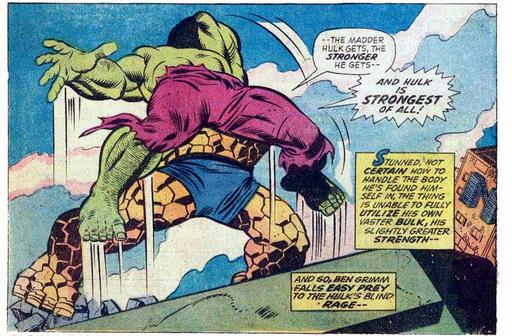
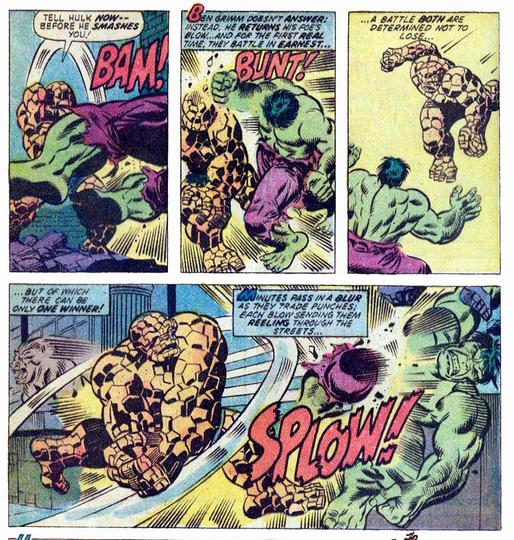
In The Hulk Annual 18, 1993, the Thing and Hulk are at a time in their lives when they have a weekly arm wrestle. These are perfect laboratory conditions: complete concentration, no emotion from the Hulk, and no fear of accidentally hurting others from The Thing. The story shows they are evenly matched. Granted, it's post 1991 and clearly intended as humor, so not necessarily canon, but it reveals the thinking of the writer, the legendary Peter David: the man who knows the Hulk better than anyone.
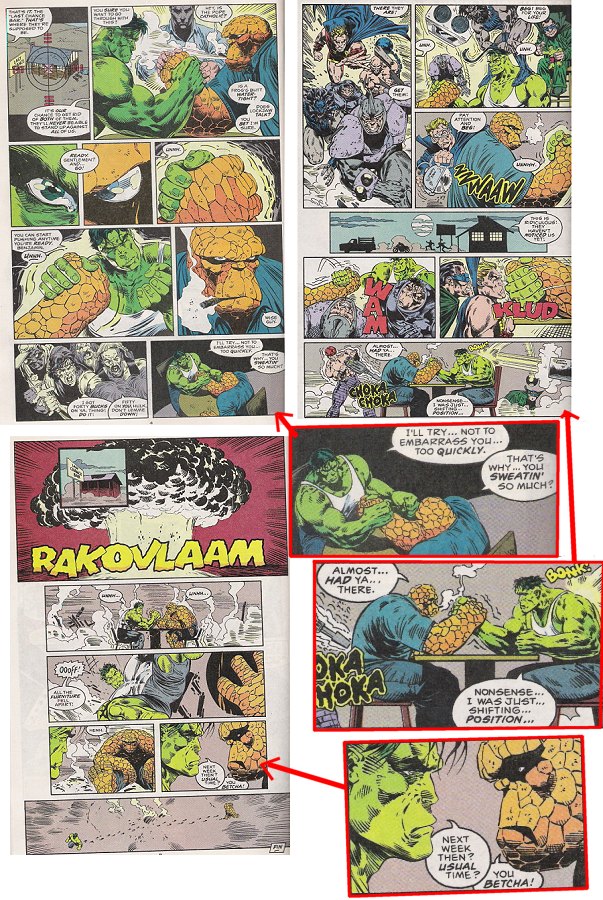
Note that they had an arm wrestle once before, in Hulk 122, but at the time the Thing was under the illusion that he was weaker, so he gave up. This was around the same time as Fantastic Four 112, when, with his psychological restraint removed, the Thing was again a good match for the Hulk - any strength difference was merely due to the Hulk being larger.
It is often assumed that Ben is weaker than the Hulk because the Hulk routinely jumps large distances, and Ben does not. Ben thinks he is unable to absorb the force of a long fall, but he is wrong.
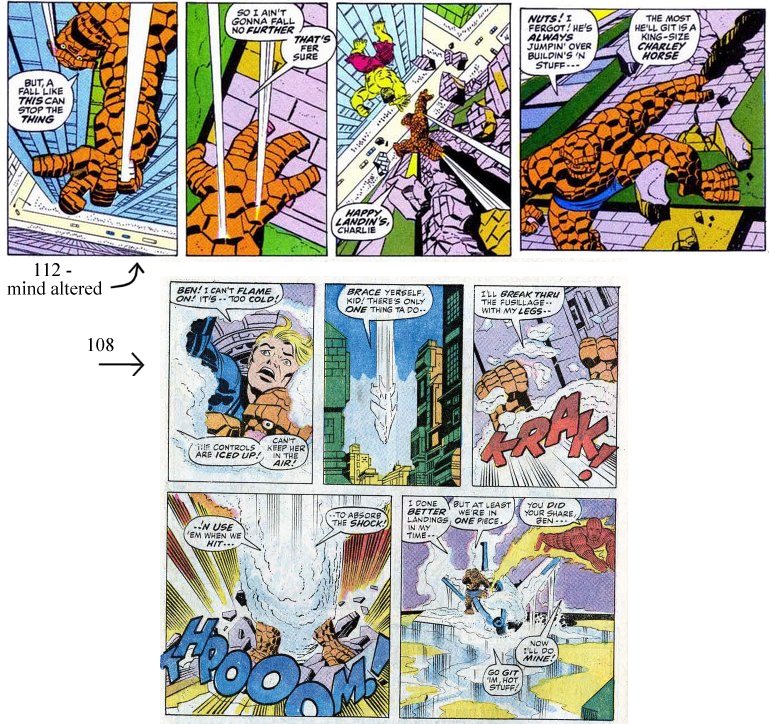
As Sharon discovered in FF311, a "Thing" body is almost impossible to damage. And she really tried!
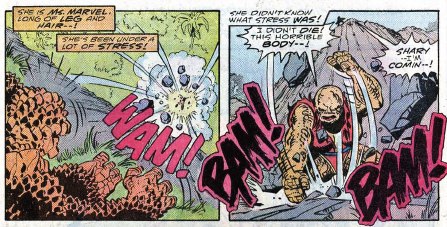
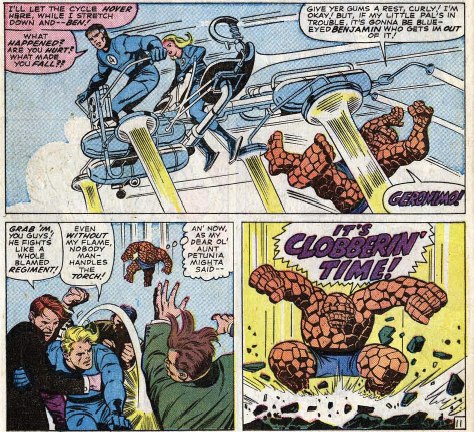
So Ben is perfectly capable of absorbing massive forces after a jump. But does he have the strength to leap like the Hulk? Yes he does.
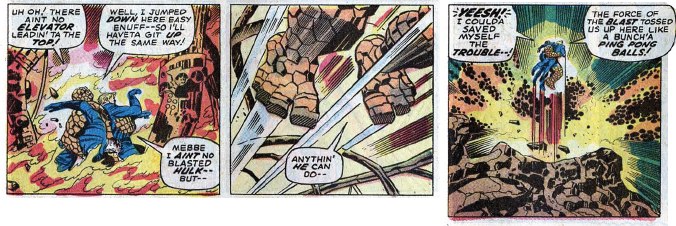
In this example, from their first ever meeting, the Hulk had much
less strength than the Thing, yet could still jump. So the Thing has plenty of strength
for great jumps. Even Spider-Man jumps modest distances,
and he's weaker than the Thing.

So why does Ben not jump? There are at least three possibilities:
Maybe Reed undermined his confidence so much in the early days that he is unconsciously convinced that he can't, even though he can.
Possibly his rocky form makes it difficult: the explosive force of a jump requires joints to rotate at incredible speed, not just incredible force, and perhaps the rocks get in the way?
Perhaps it's psychological. When you jump large distance you do not know where you will land: it's like firing a bullet randomly into the air. The Hulk does not care (or in the early days he only jumped in deserts), but the Thing does: unconsciously he will not let himself take that chance.
Or maybe Ben never mastered the telekinetic part of it. Feats of ludicrous strength are largely telekinetic: e.g. so you can lift an item by the corner without it crumbling, or in this case so you can land on normal ground without making a gigantic hole. The Hulk got a lot of practice in the early days by carrying Rick Jones: Rick could not survive the sudden acceleration like the Hulk could, so old Greenskin must have learned how to moderate his speed during the flight. The Thing never had the practice, so he never learned how. As far as I know, no other super-strong character ever managed it either.
The false belief that Ben is much weaker than the Hulk originates in FF 133. Ben was already suffering from a serious head injury, so a massive blow to the head was enough to almost knock him out. This had nothing to do with his muscles, it was simply his head injury.
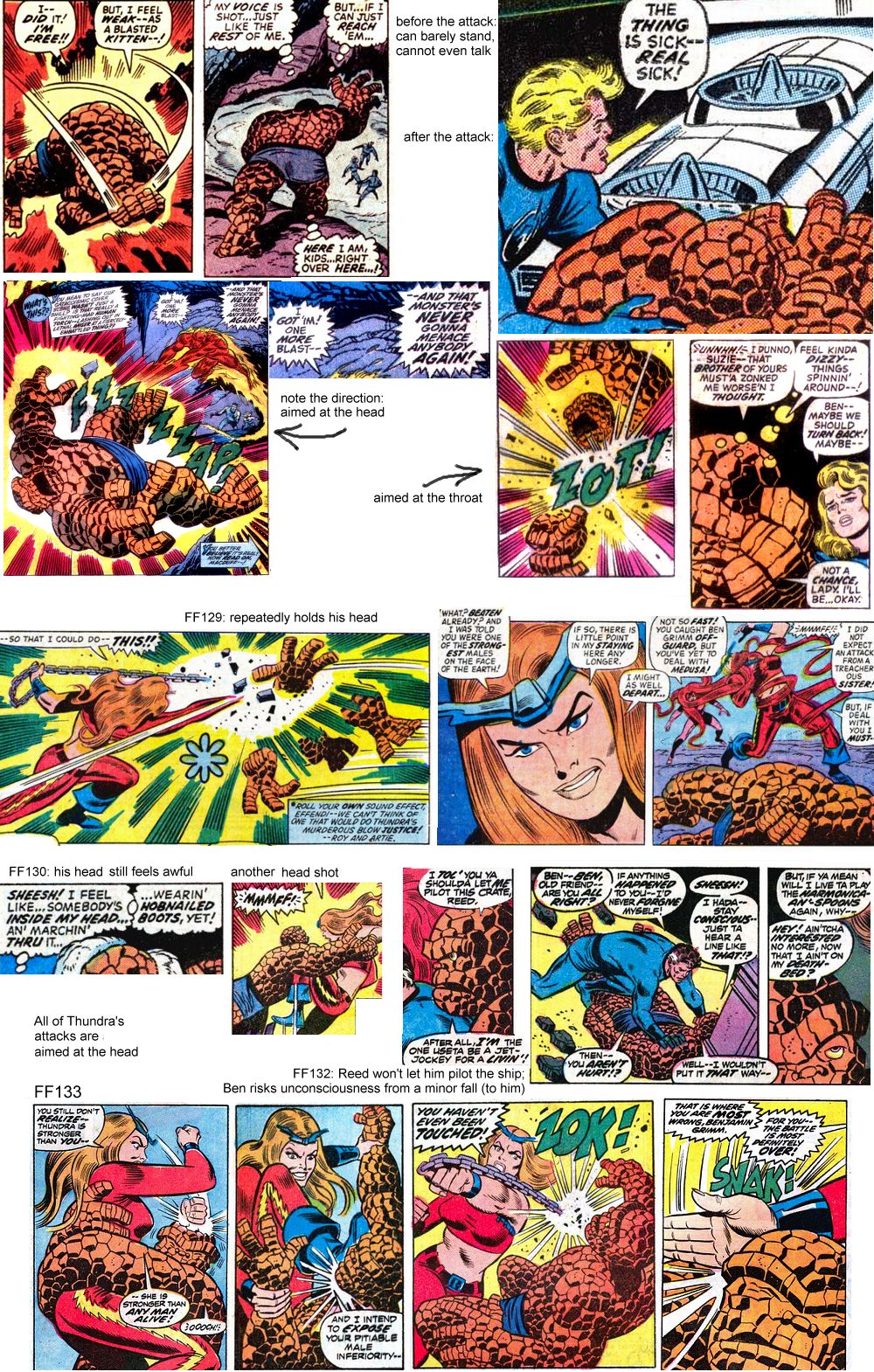
Also note his unconscious unwillingness to hit a lady. And the fact that Thundra is the strongest fighter on her planet, who specialises in defeating the most save super powered males. She has a very specific technique, to hit them in just the right part of the head with multiple tons of force. Ouch!
Back near the start of Ben's career, Reed had 3 ton weight
installed: he must have concluded, based on his experience, that
this was near to Ben's limit. Soon after (in FF18, 1963) the
Skrulls estimated Ben's lifting capacity at five tons.
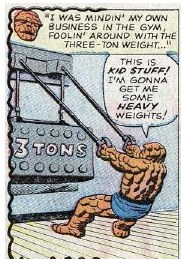
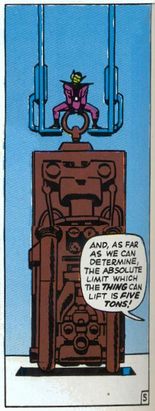
But most of Ben's feats of strength are near to other people, and he unconsciously holds back for fear of hurting them, as seen here in FF annual 5 and FF250.
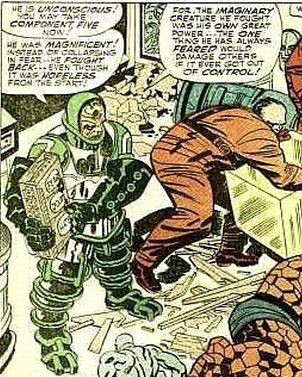
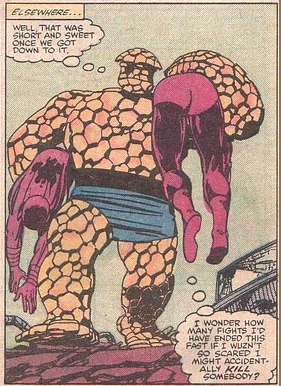
Apparently he also holds back when exercising, unconsciously thinking about using his strength in battles. When he is thinking of something else we see a very different strength level. In this case (from FF6, 1962) he simply has to squeeze some metal. It was a matter or pride so he was able to give extra force. Note the look on Johnny's face: Johnny was accustomed to Ben's normal strength level, so this was a real shock.
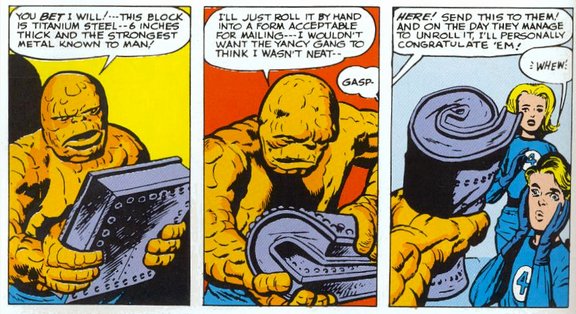

How much force was applied? I showed this image to some engineers and they suggested a ballpark figure of around 150 tons. Mainly because pure titanium is brittle and the rivets imply a regular steel case. The block appears to be some kind of tile for the purpose of supporting vast weight (or possible absorbing heat or some other property). The rivets do not pop out when bent so they were probably there to hold the casing together during manufacture while it was welded solid. So the Thing, in effect, is bending a thick steel box containing very strong but brittle solid. If the titanium were some less brittle alloy then the final stage, twisting the edges very near to the point of bending (which is much, much harder than twisting a long metal pole), would take around half a million tons of force. It would also make the object extremely hot: the energy of bending has to go somewhere. As you can see, there are many variables, and a wide range of possibilities. But at the very least, given that the Thing is honest and as a test pilot has some experience of engineering, we must conclude that he exerted many many times his "five ton" limit.
A similar event happened a few issues later: when angry and distracted, he suddenly had access to vastly more strength:
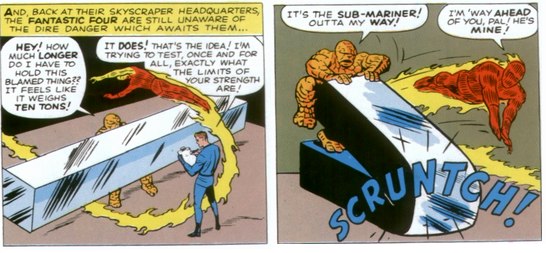
Most of the Fantastic Four can be seen as a portrait of the depth of Ben's psychological frustration. it runs so deep that it prevents him from changing at will, either to human or to being the Thing:
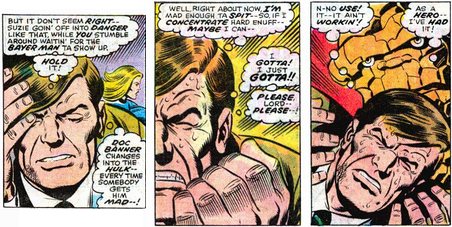
In FF issue 18 the Skrulls estimated that Ben could not lift more than five tons. At around the same time, in an early issue of Strange Tales, he is tied to a ten ton object. Johnny is near him and he is worried about Alicia (their opponent is the Puppet Master), so the usual worries are present: he is only just able to move. But when those restraints are removed his strength seems to have almost no limit. This example id from FF 92, on a Skrull planet, when Ben's brain is recovering from mental control:
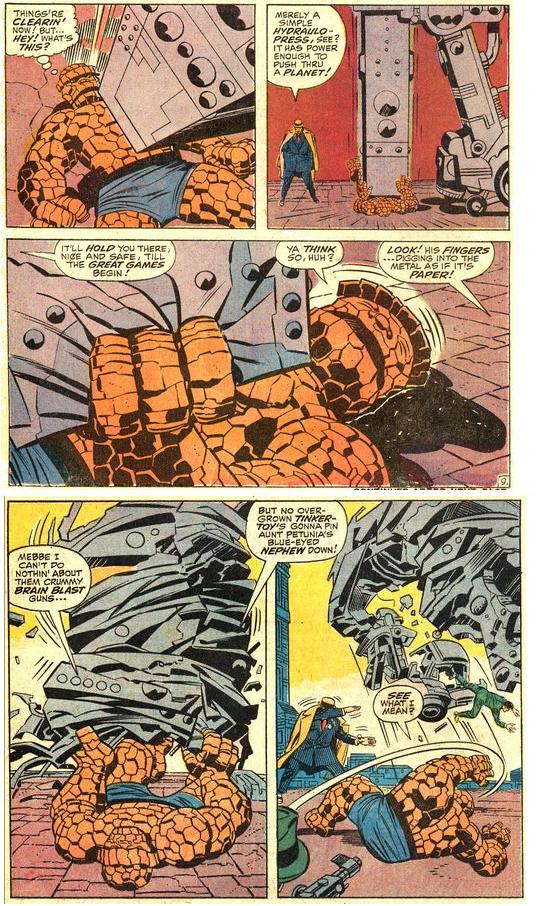
The last frame makes it look like the hydraulo-press was carried by a car, But this is an alien world and looks can be deceiving. It clearly isn't just a heavy pile of metal, or the Thing could have just knocked it over sideways, or lifted it without crumpling it. Clearly it has some special kind of force (magnetic? gravitational?) to give it the power it needs.
The hydraulo-press looks like an earth pile driver, but is designed to push through planets. Earth based pile drivers typically have a ramming force of between 80- and 500 tons. they achieve this by weighing maybe 20 tons and being dropped from several feet. (It appears from the pictures that the Skrull hydraulo-press does not need to be dropped to have its force varied, so it probably operates on a different principle. It appears to be vibrating.)
If earth based presses can achieve 500 tons, and the Skrull press could achieve much more than this, then it appears that The Thing can lift over a thousand tons when he has to, when pushed to the limit. Notice that at this time he was influenced by a "brain blast" mind control ray, and was highly frustrated at not being able to escape previously. So the usual psychological blocks probably did not apply.
A typical main bridge cable supports ten thousand tons. I'll write that again: TEN THOUSAND TONS. On at least two occasions - in Strange Tales 131 and Fantastic Four 234, The Thing has held bridge cables together for an extended period. In both cases, The Thing was holding the main cables.
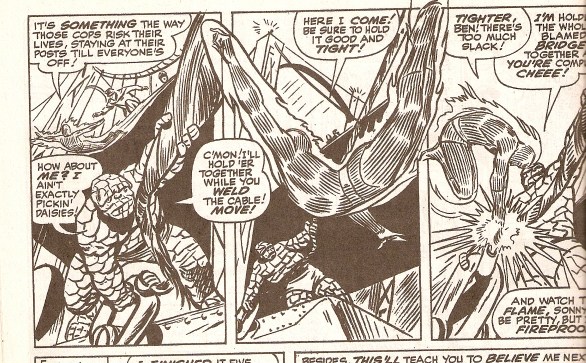
Note: in FF234 Ben later received help from Skip Collins ("the man with the power") but Skip didn't see Ben until AFTER he held the cables together. Ben then notices that the Bridge changes to feels lighter. Before that it was heavier, and Ben still held it: For a time, The Thing supported the entire weight of the bridge - tens of thousands of tons - without help.
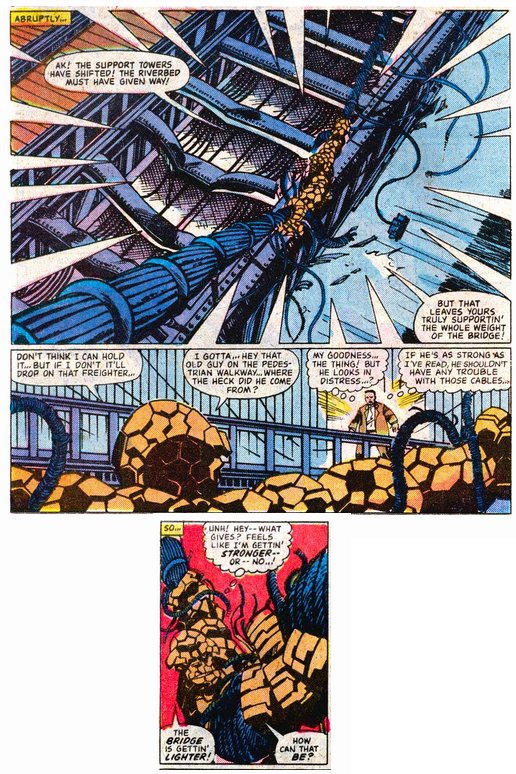
In summary, the Hulk's defining psychological characteristic is anger. The angrier he gets, the stronger he gets. The Thing's defining psychological characteristic is stubbornness: and it appears that the more stubborn he gets, the stronger he gets. The times when The Thing shows the greatest strength are when either the psychological restraints are reduced (e.g. on the Skrull world) or when he believes that thousands of lives depend on him (lifting the bridge, or fighting Champion.) Stubbornness seems to be the Thing's equivalence to the Hulk's rage. They both increase their strength in response to stress. However, the Hulk becomes angrier as he fights, whereas The Thing maintains self control out of fear of hurting others. That is the main difference between the two.
The bottom line: the Thing is consciously able to lift less than the Hulk. But unconsciously, under the right circumstances, he can call on almost unlimited strength. When he does.. watch out, world!
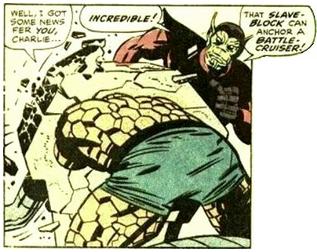
About Ben and Reed
So why can't Ben change back?
As the story develops over the years it becomes clear that the
reason Ben cannot change is psychological (this is finally stated
clearly in FF245, but the clues are there all along). For most of
the story it was Ben's need to impress Alicia, but in the early
days Ben was trying to impress Sue. Consider the influences on his
self confidence:
In summary, Sue began the problem. She very quickly became
compassionate, but the early damage was done. Since then Reed
pushed the knife in deep and twisted it over the years. He didn't
mean to, but he lacks emotional empathy so cannot see what he is
doing to his best friend. Ben will never obtain peace until he
came to accept himself in act 5.
"So Reed is bad?"
Ben is not innocent here. His years of suffering are a result of his anger at the start. Reed always did the best he possibly could, but Ben could not see that. Ben lashed out angrily, and Reed concluded that Ben had anger problems. So Reed treated Ben like a child, and that just made it worse. Neither man is guilty, they simply have small human weaknesses: Ben has anger and self hatred, Reed has difficulty in seeing how his words might hurt. Both men are both great heroes brought low by small flaws. In that sense this is a Shakespearean tragedy.Acts 1-3, defeated by Reed
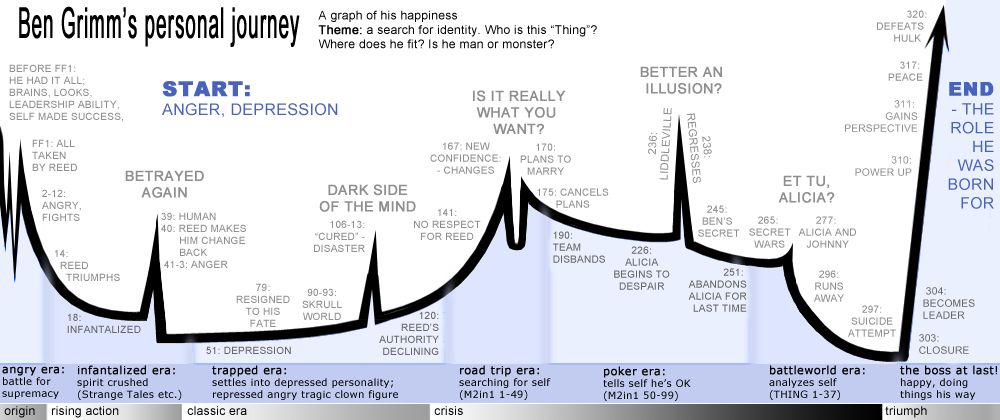
Acts 4: recovery, finding
himself
The future: reconciled with
Alicia
I have noted elsewhere that characters have changed since 1991
(see the end of the
Marvel Universe and the end of
Fantastic Four continuity). Since 1991 The Thing has been
the Whorf character - the one that newcomers defeat to show how
strong they are. This page is not about the new, weak Thing. This
page is about the original Thing, the Ben Grimm created by Stan
Lee and Jack Kirby.